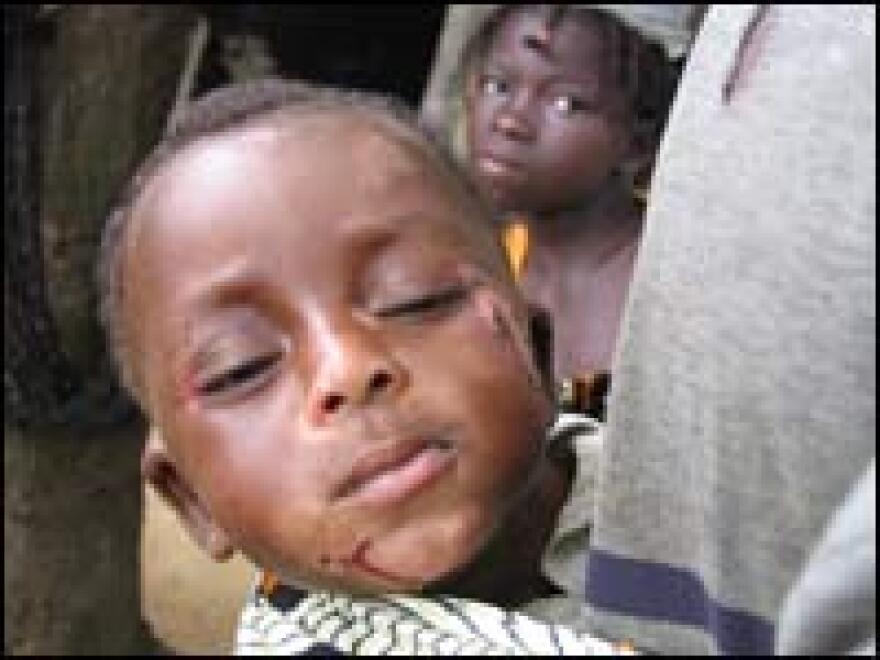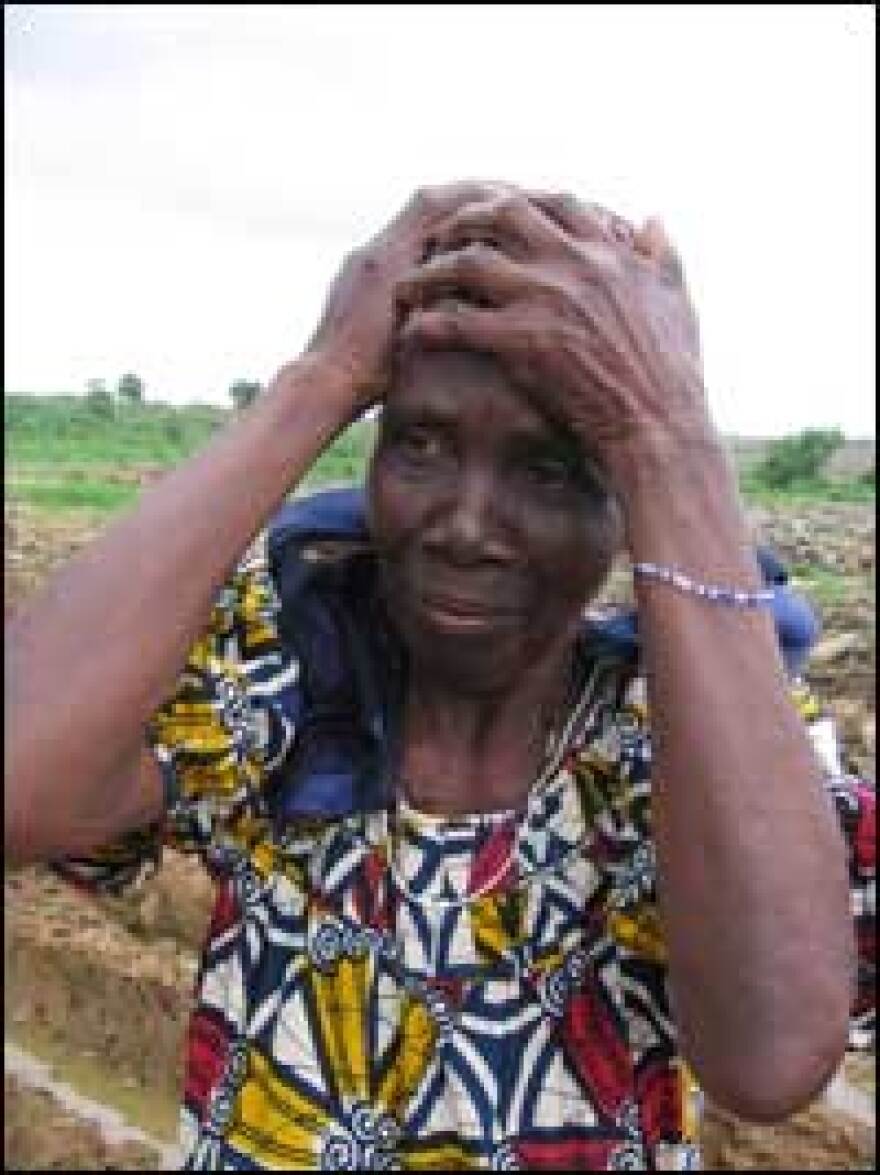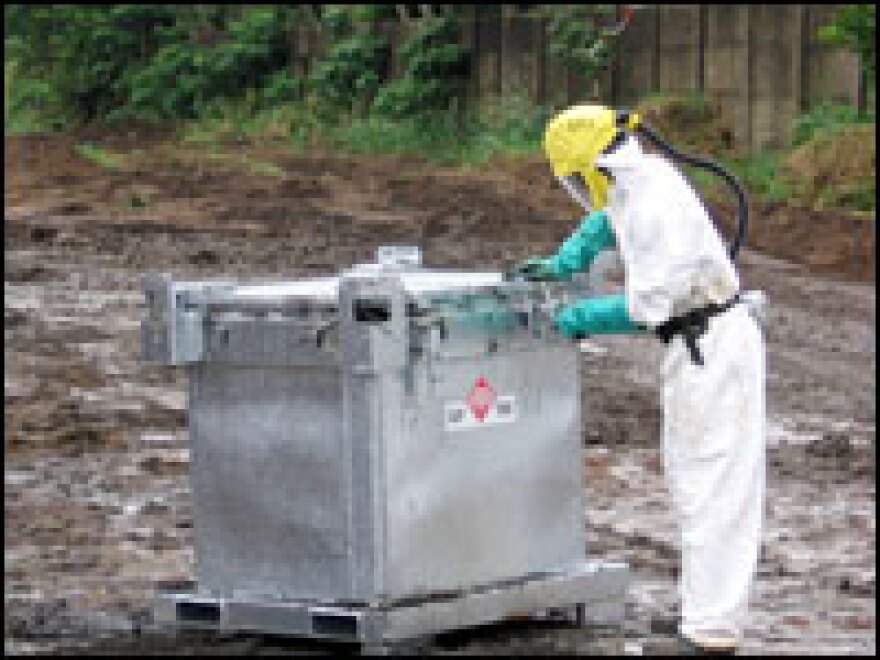

Two months after hundreds of tons of toxic waste were dumped in and around the West African city of Abidjan, in Ivory Coast, the putrid stench and poisonous fumes have faded. An international scandal has not.
To date, at least 10 people are dead, 70 hospitalized and tens of thousands have been made sick. The clean-up operation began last month and continues, in a toxic waste affair whose fallout brought down the government.
Just yards away from where a French environmental-waste disposal company is cleaning up Abidjan's main landfill, an elderly woman walks towards her home nearby. Elisabeth Awo Djeketou looks down at the dump site, where professional cleaners work in white protective jumpsuits, white gloves and masks. Djeketou was one of tens of thousands of Abidjan residents who woke up one August morning to a foul smell of petroleum mixed with garlic and rotten eggs.
"It was difficult to breathe, difficult to sleep, difficult to eat and to drink," Djeketou says through a translator. "You felt like vomiting the whole time, and it burned your nostrils. This nauseating stench seeped through the whole village. It was unbearable. So many people have moved away to get away from the smell."
A Tangled Web of Globalization
The poisonous stench came from a mix of petrochemical waste transported by a Panamanian-registered tanker chartered by the Dutch firm Trafigura. The pitch-black sludge found its way from Amsterdam -- via Estonia and Nigeria -- to Ivory Coast aboard the Korean-built and Greek-managed Probo Koala.
And it was later illegally dumped, in the dead of night, by a local company called Tommy at open-air sites all over Abidjan -- right in the yards of Djeketou and other residents.
Trafigura said in a statement that tests performed on the waste in Holland proved it was not toxic. Yet almost a dozen people have died. Dozens more have been hospitalized, and more than 100,000 have sought medical treatment.
"We cannot state that there is strictly no link between the discharge and the health consequences," says Eric de Turkheim, an executive of the Dutch company. "Obviously, we do not know if there has been any attempt to use the product in any way, shape or form which could in any way have generated eventually some toxicity."
The toxic-waste scandal has rocked Ivory Coast. Within days of the illegal dumping, the nation's interim government resigned. Public anger boiled over. Mobs of youths attacked the home of the head of Abidjan Port and dragged the deposed transport minister from his car and beat him up.
A Too Common Toxic-Waste Scheme?
Executives of Trafigura and Tommy are currently in prison in Ivory Coast. Criminal investigations have begun in Ivory Coast and Europe.
Environmental activist Jim Puckett, of the Seattle-based toxic-trade watchdog Basel Action Network, says Africa is too often chosen as an easy target for dumping hazardous waste.
"Of course, there has to be a full investigation," Puckett says. "But from the normal way of looking at things, it very much appears that this is a typical waste-trade scheme, where a company wanted to save some money and decided to save it on the backs of Africa, hoping they could get away with it. And then the waste that was dumped was, in fact, a lot more noticeable and in fact killed people -- and that's why they got caught."
Meanwhile, the clean-up continues. Henri Petitgand is the spokesman for Tredi International, the French company processing the waste in Ivory Coast.
"We've treated all sorts of toxic waste, what I'd call classic waste, over the years," Petitgand says. "But the toxic industrial waste that we've found here in Ivory Coast, I have to admit, this is a first.
"But wearing the right protective gear, we moved in as quickly as we could to start work and, most importantly, to protect all the communities affected by the waste dumping."
Lasting Toll in Villages
Skepticism abounds among the residents of Dgibi village, on the northern outskirts of Abidjan.
Today, children in Dgibi are again happily playing. But not so long ago, they were coughing and complaining of head, chest and stomach aches, itchy skin, stinging eyes and nose bleeds.
Adjiratou Ouedraogo, 19, showed us the face of her infant son, Salame, still covered in weeping blisters that erupted shortly after the stinking waste appeared in their neighborhood. There are more welts on his tiny body, she said.
Dgibi residents complain that the poisonous waste hasn't yet been cleared from their area. Speaking angrily, Alfred Gnanguy Adou, a subsistence farmer, asked what the government was planning to do about their problems.
"The authorities have banned any crop harvests within a 500-yard radius of any toxic waste," Adou says. "But they dumped the stuff right by my farm. And that's how I feed my family. What am I to do? Who's going to compensate me? This is a disgraceful and scandalous affair, and the government must get to the bottom of it."
Search for Justice
A group of concerned Ivorians has set up the Toxic Waste Victims' Association. They say the authorities in Ivory Coast and in Europe must establish how the illegal and highly noxious waste ended up in Abidjan, and they must ensure that those responsible are brought to justice.
"Officially, they say only 10 persons died from this toxic waste. But it's not true," says Maurice Dakouri, a leading member of the Toxic Waste Victims' Association. "What they can say about the 10 is those who died in hospital. What about those who didn't go to hospital and who died, too?"
Dakouri says the government has been minimizing the impact of the scandal.
Officials say the cleanup operation should finish this month. The waste will eventually be shipped back to Europe, but no specific destination has been agreed to.
Copyright 2023 NPR. To see more, visit https://www.npr.org.







